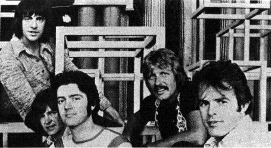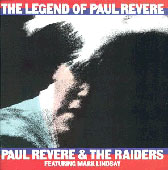|
The Downbeats evolved into Paul Revere and the Raiders. In 1961, Gardena Records released a raucous instrumental, "Like Long Hair," which became their first national Top 40 hit. After that, their regional fame mushroomed, and by 1963, they were one of the hottest bands in the Pacific Northwest. Deejay Roger Hart paid for a demo tape session and the boys recorded a favorite, "Louie Louie." Although a rival group, the Kingsmen, beat them to the charts with the song, the Raiders did wind up with a new label contract, making them the first hard rock band signed by Columbia Records. In 1965, Dick Clark signed the boys to appear regularly on "Where the Action Is," a daily musical-variety series. It premiered over ABC-TV on June 27, and six months later the Raiders were off and running with their first major vocal hit, "Just Like Me." It was followed by "Kicks," a powerful anti-drug song; and then, from the album Spirit of '67, "Hungry," "The Great Airplane Strike" and "Good Thing."
"Ups and Downs" was their first hit in 1967, and after that came a down -- the cancellation of "Where the Action Is." The hits continued, though, with "Him or Me (What's It Gonna Be)" and "I Had a Dream," both from the album Revolution. Then, on January 6, 1968, the Raiders returned to TV as the stars of Happening '68. Over the summer, that show expanded to six days a week, and became known as It's Happening. From the album Something Happened came two good sellers: "Too Much Talk" and "Don't Take It So Hard." In the spring of 1969, the Raiders made the Top 20 for the ninth time with "Mr. Sun, Mr. Moon." By then, they were clearly one of America's favorite rock bands, yet their records were rarely played on "progressive" FM stations. To counter this, the boys sent out test pressings of their next album under the name of Pink Puzz. FM programmers played it heavily and endorsed the "new band" until they found out it was really Paul Revere and the Raiders. From that album came another major single, "Let Me." Later in '69, Happening went off the air and Mark Lindsay, the group's focal point, lead singer and chief songwriter, began a concurrent solo career with the Top 10 tune "Arizona." That million-seller was followed in 1970 by "Silver Bird."
The band decided to cut down their concert schedule. That pace had allowed only two or three days to knock out an album, two or three takes to cut a single. With the added time, they hoped to accomplish something that they had come close to but hadn't yet achieved -- a number one record. They came across a lament written by country songwriter John D. Loudermilk. It concerned the plight of the Cherokees who, in 1791, were moved from their home in Georgia to Oklahoma. Mark, whose ancestry was part Indian, thought that this would be a good tune to try. It had already been a hit once -- in 1968 -- for Don Fardon. The track was almost released as a Mark Lindsay record, but at the last minute, the group decided to put their collective name on it. Paul Revere then took a seven thousand mile motorcycle ride, visiting three stations a day, to help promote it. The song broke nationally in mid-April 1971, beginning a 22 week run on the charts. By July, it was the most popular tune in America. "Indian Reservation" wound up being not only the Raiders' biggest hit, but the best-selling single Columbia Records had issued. Indians in Salt Lake City even used it as a publicity song in their struggle for civil rights. In the fall of 1971, the Raiders had one final hit, "Birds of a Feather." Lindsay quit the group in 1975, though he did rejoin Revere the following year to capitalize on America's bicentennial with a tour and album. Since then Lindsay has worked briefly in A&R, but mostly forged a successful career singing commercials. Revere, meanwhile, tours some 250 nights a year with a band of Raiders that have been with him on and off since the Seventies. In 1985 the group returned to TV on a summer series, Rock'n'Roll Summer Action, on ABC. In subsequent decades Lindsay forged a successful career singing commercials, and Revere toured some 250 nights a year under the moniker Paul Revere's Raiders. Revere succumbed to a battle with cancer on Oct. 4, 2014, at age 76. "Indian Reservation" songwriter John D. Loudermilk passed away on Sept. 21, 2016 at the age of 82.
No comments so far, be the first to comment. |


